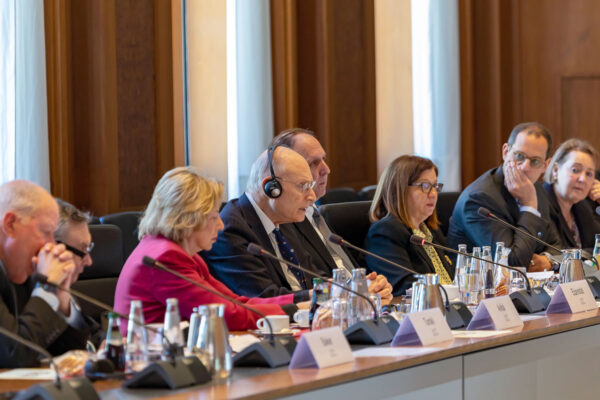Holocaust Survivors Will Continue to Receive Additional One-Time Payments from the German Government Until 2027 As a Result of Claims Conference Negotiations
Claims Conference in the Media | Press Inquiries | Publications | Videos | Updates
Home Care Services Funding For Holocaust Survivors Will Increase An Additional $105.2 Million For A Total Of $888.9 Million; Outcomes For These Negotiations Also Include Expanded One-Time Payments Per Year Through 2027, Impacting More Than 128,000 Holocaust Survivors Worldwide.

Claims Conference Delegation for negotiations with the German government. From left to right: Board member, Rabbi Andrew Baker; Survivor Representative, Marian Turski; Vice President, Amb. Colette Avital; Chair of the Negotiating Delegation, Amb. Stuart Eizenstat; Executive Vice President, Greg Schneider; General Counsel, Karen Heilig; Representative in Germany, Ruediger Mahlo; Legal Advisor in Germany, Christiane Reeh.
NEW YORK, NEW YORK: June 15, 2023—Today, the Conference on Jewish Material Claims Against Germany (Claims Conference), announced the outcomes of their negotiations with the German Federal Ministry of Finance on behalf of Holocaust survivors living globally resulting in approximately $1.4 billion in direct compensation and social welfare services for survivors. Outcomes of these negotiations, include nearly $105.2 million in additional funding for home care programs to address survivors’ increased needs. Additionally, a one-time payment per year to recipients of the Hardship Fund will continue to be paid until 2027. This is impacting more than 128,000 Holocaust survivors globally.
Greg Schneider, Executive Vice President of the Claims Conference said, “Every year these negotiations become more and more critical as this last generation of Holocaust survivors age and their needs increase. Being able to ensure direct payments to survivors in addition to the expansions to the social welfare services we are able to fund is essential in making sure every Holocaust survivor is taken care of for as long as it is required, addressing each individual need.”
The continuation of the additional one-time payment to Hardship Fund recipients carries tremendous historical relevance. Originally established to be a one-time payment, negotiations during the COVID-19 lockdowns resulted in three supplemental payments for eligible Holocaust survivors. This year, Germany again has agreed to continue this payment, which was set to end in December 2023, through 2027.
The survivors receiving these payments largely include Jews from the former Soviet Union who were not in camps or ghettos and are not eligible for pension programs. These survivors fled the Einsatzgruppen—Nazi mobile killing units charged with murdering entire Jewish communities. More than 1 million Jews were killed by these units, which operated largely by shooting hundreds and thousands of Jews at a time and burying them in mass pits.
For those who were able to flee and survive, they are some of the poorest in the survivor community; the loss of time, family, property and life cannot be made whole. By expanding payments to these survivors, the German government is acknowledging that this suffering is still being felt deeply, both emotionally and financially. While symbolic, these payments provide financial relief for many aging Jewish Holocaust survivors living around the world.
Ambassador Stuart Eizenstat, Special Negotiator for the Claims Conference Negotiations Delegation said, “I am inspired that, as shown by the extraordinary results we have achieved this year, so many decades after the end of World War II, far from waning, the German government and its people continue to feel a deep responsibility to provide additional care to Holocaust survivors. It has been nearly 80 years since the liberation of Auschwitz and the need to negotiate for survivor care and compensation is more urgent than ever. Every negotiation is a near-last opportunity to ensure survivors of the Holocaust are receiving some measure of justice and a chance at the dignity that was taken from them in their youth. It will never be enough until the last survivor has taken their last breath.”
Home care services are provided through the Claims Conference’s network of more than 300 social welfare agency partners across 83 countries. In addition to delivering in-home services, social welfare agencies engage directly with Holocaust survivors, ensuring their individual needs are met from food packages to medical needs to transportation to appointments and socialization. These are all critically important to this last generation of Holocaust survivors who are finding their needs more costly in their waning years.
Holocaust education funding also saw growth in this year’s negotiations. As this last generation of Holocaust survivors wane, the testimony and lessons they have to share must be remembered. It is essential that survivors know their legacy will be carried forward by the generations that come behind them. To this end, the German government and Claims Conference have been in long-term discussions to ensure that the lessons of the Holocaust will not be lost as we transition from first-hand memories and lived experiences into history.
Recent global Holocaust Knowledge and Awareness Surveys indicate that knowledge of the Holocaust is fading. While surveys in the U.S., Canada, Austria, France, the U.K. and The Netherlands show a decline in knowledge of key facts about the Holocaust across all populations, they also indicate a strong desire to keep Holocaust education in schools so that something like the Holocaust does not happen again. One of the goals from the ongoing negotiations with the German government is to improve funding for education programs that will ensure future generations have access to cutting-edge, innovative Holocaust education programs.
Specific outcomes from these negotiations include:
- Home Care Services: In 2024, $888.9 million will be provided for home care services, including an additional $105.2 million in funding to address survivors’ increased needs.
- Hardship Fund: More than 128,000 Holocaust survivors will receive a one-time payment under the Hardship Fund, which has been negotiated for 2024 through 2027. The amount for each of the additional years was set at €1,250 per person for 2024, €1,300 for 2025, €1,350 for 2026 and €1,400 for 2027.
- Holocaust Education: Funding for Holocaust education has been extended for two more years and increased each year by €3 million. The newly negotiated funding amounts are €38 million for 2026 and €41 million for 2027.
- Total compensation: The total amount of direct compensation for survivors, including one-time payments and monthly pensions, is projected to be $535 million for 2024.

